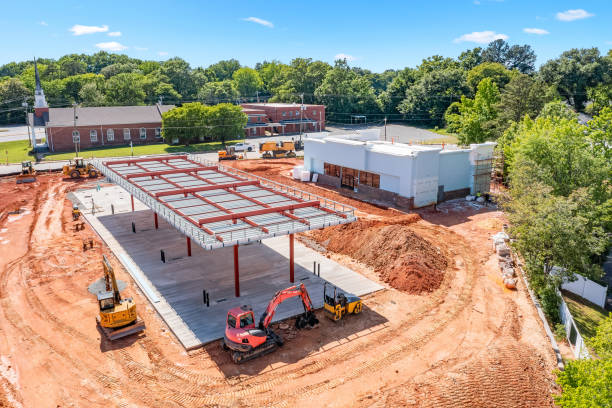The construction industry, long known for its reliance on traditional methods, is undergoing a transformative evolution driven by technological innovations. Construction services are using cutting-edge technologies to reach unprecedented efficiency levels as demands for cost-effectiveness, sustainability, and speedier project delivery continue to climb. This article will examine how technology is changing the construction business, from innovative project management techniques to previously unheard-of processes, and how these changes are propelling the sector ahead.
Building Information Modeling (BIM)
Building Information Modeling (BIM) is at the forefront of technological breakthroughs in construction services. Building Information Modeling (BIM) is an advanced 3D modeling tool that facilitates seamless collaboration between architects, engineers, and construction experts across the course of a project. With this technology, a building’s functional and physical attributes can be fully represented digitally, going beyond the limitations of standard 2D plans. Stakeholders may see, evaluate, and optimize every component of a project by incorporating BIM into construction services. This improves coordination, lowers errors, and improves decision-making.
Drones for Site Surveying and Monitoring
Gone are the days of manual site surveys and time-consuming inspections. Drones have emerged as invaluable tools in construction services, revolutionizing site surveying, progress monitoring, and safety assessments. Drones with high-resolution cameras and sensors can instantly take precise pictures of building sites and send project managers real-time data. This not only speeds up decision-making procedures but also improves safety by spotting possible risks and guaranteeing adherence to rules and regulations.
Robotics and Automation
The integration of robotics and automation into construction services is streamlining repetitive and labor-intensive tasks. Robotic technologies, such as bricklaying robots and autonomous equipment, are significantly reducing construction timelines and minimizing the margin for error. Automation in construction services also extends to tasks like concrete pouring, material handling, and even 3D printing of building components, leading to increased efficiency and resource optimization.
Augmented Reality (AR) for Design Visualization
Augmented reality is making waves in the construction industry by transforming the way projects are visualized during the design phase. Construction services are utilizing AR applications to overlay digital models onto physical environments, providing stakeholders with immersive and interactive experiences. This technology allows architects and clients to “walk through” virtual constructions, making real-time adjustments and enhancements before physical work begins. The result is a more collaborative design process that ensures alignment with project goals.
Internet of Things (IoT) for Smart Construction Sites
A new era of connection and data-driven decision-making in construction services has been ushered in by the Internet of Things (IoT). Smart construction sites use the Internet of Things (IoT) to gather and analyze data on worker safety, environmental conditions, and equipment performance. Examples of these devices are wearables and sensors. Through the utilisation of this abundant data, project managers may boost overall project efficiency, forecast maintenance requirements, and optimise resource allocation.
Project Management Software
Efficient project management is crucial for the success of construction services, and software solutions are playing a pivotal role in achieving this goal. Project management software facilitates collaboration, communication, and document sharing among project teams, ensuring everyone is on the same page. Features like scheduling, budget tracking, and task management contribute to smoother project execution, reducing the risk of delays and cost overruns.
Prefabrication and Modular Construction
Prefabrication and modular construction are not new concepts, but recent technological advancements have elevated their efficiency and popularity in construction services. Digital design tools, combined with automation, enable precise fabrication of building components off-site. This not only reduces construction time but also minimizes waste and enhances quality control. The result is a more sustainable and cost-effective approach to building construction.
Artificial Intelligence (AI) for Risk Analysis
Artificial intelligence is transforming risk management in construction services. AI algorithms can analyze vast datasets to identify potential risks and predict project outcomes. This proactive approach allows project managers to implement mitigation strategies early in the process, reducing the likelihood of delays and cost overruns. AI is also being used for predictive maintenance of equipment, ensuring that machinery is serviced before critical failures occur.
5G Technology for Enhanced Connectivity
The rollout of 5G technology is revolutionizing connectivity on construction sites. Real-time data transfer and communication are made possible by high-speed, low-latency networks, which support IoT devices, drones, and augmented reality applications. Enhanced communication facilitates better cooperation amongst project participants, leading to more effective decision-making and streamlined processes.
Sustainable Technologies for Eco-Friendly Construction
As sustainability becomes a central focus in construction services, innovative technologies are driving eco-friendly practices. From solar panels and energy-efficient building materials to advanced waste recycling systems, construction services are adopting technologies that reduce environmental impact. This not only aligns with the growing demand for sustainable construction but also positions the industry as a key player in global efforts to combat climate change.
Conclusion
The integration of technology into construction services is reshaping the industry, unlocking unprecedented levels of efficiency, collaboration, and sustainability. From the early stages of design to the final touches of construction, these innovations are revolutionizing how projects are conceived, planned, and executed. As construction services continue to embrace these advancements, the industry’s ability to meet the evolving demands of modern society will undoubtedly reach new heights, ensuring a future where buildings are not only structures of concrete and steel but testaments to the power of technological innovation.










